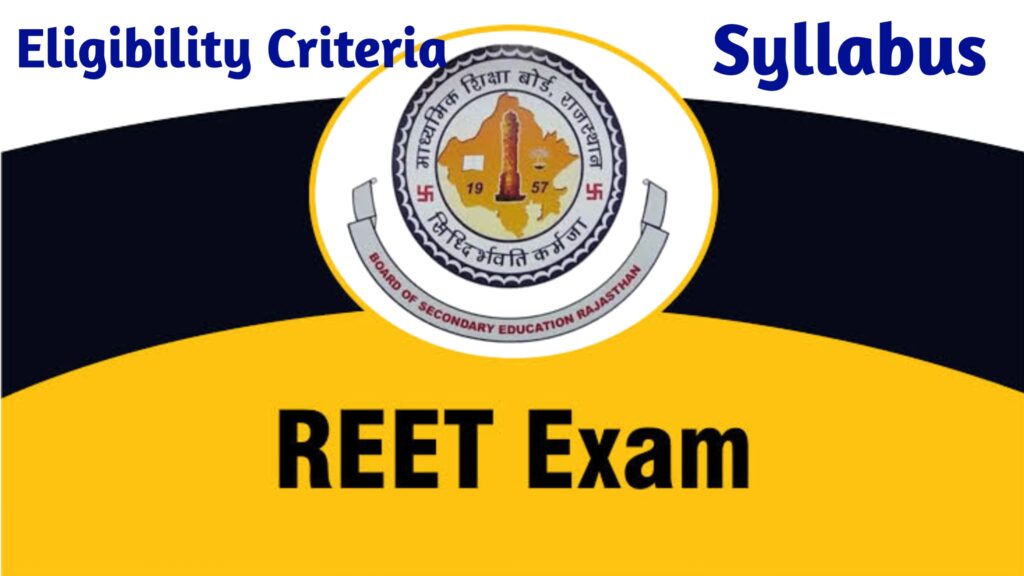Introduction
Aspiring educators can begin their profitable careers in training by passing the Rajasthan Eligibility Examination for Teachers (REET). The Rajasthan Elementary Teacher Examination Board (REET) assesses candidates’ suitability for number one (Class 1–5) and upper number one (Class 6–eight) coaching roles. Those who want to do well on the REET must have a stable comprehension of the material. This massive manual thoroughly examines the REET syllabus, separating every segment into valuable resources for efficient preparation. Here, we are talking about REET Syllabus.
Here we are discussing the REET Syllabus:

Comprehending the REET Curriculum
Paper 1: Elementary School Level (Classes 1–five)
Child Development and Pedagogy:
The principal goal of this section is to examine the developmental stages of children (primary college age) from 6 to 11 years old. Topics like moral growth, social and emotional development, and cognitive development are protected.
Additionally, applicants must be informed about inclusive training theories and methods for teaching college students with astounding desires. Understanding the desires of various rookies and adjusting teaching strategies is essential.
Language acquisition strategies, teaching strategies for the language competencies of talking, listening, studying, and writing, and proficiency assessment are all part of the pedagogy of language development.
English Language (I):
Comprehension: Candidates must practice passages and write solutions primarily based on them. Pay close attention to the summary, inference, terminology, and vocabulary; keep writing the critical points while reading the passage.
Language development pedagogy: This covers strategies for teaching language abilities, including phonetics, vocabulary building, and grammar education.
Hindi (Language (II)
Comprehension: To examine comprehension competencies, applicants must rehearse studying passages in Hindi and responding to questions, like inside the English component.
Pedagogy of Language Development: Gaining information on the fundamentals of teaching Hindi with academic techniques, video games, and other activities that inspire language acquisition in simple faculty college students.
Quantitative Analysis:
Number System: Knowing the basics of number system units, which include fractions, decimals, ratios and proportions, and other numerical concepts. Solving expression questions and using arithmetic techniques to solve the questions
Geometry: The geometry part covers the measurement, area, and perimeter of rectangles, squares, circle
Studies at the Environment:
The primary faculty curriculum is the principle consciousness of this segment, which is related to the surroundings, society, and lifestyle.
- Subtopics encompass tours, water, meals and nutrients, one’s family and pals, etc.
- Field visits, immersive getting-to-know, and arms-on activities are all prioritized in environmental studies pedagogy, allowing you to teach ecological science thoughts correctly.
Upper Primary Level (Classes 6–8) Paper 2
Pedagogy and Child Development:
This section’s primary intention is to comprehend the social, emotional, and cognitive development of bare faculty-age children between the ages of eleven and 14.
Candidates must be informed about inclusive training techniques, motivation, evaluation strategies, and getting-to-know theories.
Understanding numerous coaching pedagogies, curriculum development, and evaluation techniques appropriate for higher primary kids are all part of the pedagogy of gaining knowledge.
English Language (I)
Comprehension: Candidates must strengthen their vocabulary, critical questioning, and inference abilities by practicing comprehension passages.
The powerful strategies for teaching language talents, grammar, composition, literary appreciation, and language games are known as pedagogy of language development.
Hindi Language
Comprehension: Candidates must practice Hindi comprehension passages, focusing on grammar and terminology. They should also be able to explain and respond to questions in English.
Pedagogy of Language Development: This is the Method for educating students in Hindi in literature, composition, and grammar, It Should be strong in proficiency and should be taught in a way that is easy to grasp
Science and Mathematics :
Mathematics: Includes subjects like info handling, algebra, geometry, measurement
Mathematics pedagogy: Using manipulatives, problem-fixing abilities, effective teaching tactics, and evaluation structures so that students can understand in a more straightforward manner
Science: Subjects protected consist of nutrients and fitness, sound and light, heat, energy, and count number and its traits, resources, and natural occurrences
Science pedagogy: Using inquiry-primarily based learning, experimentation, observation, and realistic physical activities to educate scientific topics correctly and need to have good practical knowledge
Studying Social Studies:
This section covers political technology, economics, geography, records, and social and cultural subjects.
Applicants must be required to have a thorough comprehension of those subjects and their applicability to the upper number one curriculum.
Social studies pedagogy concerns academic approaches, materials, and assessment techniques for social technology courses.
Advice for Efficient Planning
Know the Concepts:
Devote time to studying the core thoughts behind every situation and coaching methodology.
Consult NCERT texts and dependable assets to establish.
Make a Study Plan:
Formulate a well-prepared timetable that allows time for every topic and issue.
Sort topics into precedence lists in keeping with your strong area and weak spot, and ensure the syllabus is flippantly covered.
Practice regularly:
Complete past year paper questions and sample papers to improve time management.
Take mock papers to see how you prepare and replicate exam conditions. Change your preparation method according to the mocks. Mock papers will help with revision and improve time management.
Make Wise Use of Resources:
There are adequate resources available to prepare reference books and internet resources.
Enroll in online classes or offline classes and practice more both offline and online.
Remain Up to Date:
Stay informed about the latest occasions, developments, and pedagogical traits pertinent to the REET examination.
To grow your knowledge, participate in discussions, attend seminars, discuss with your friends, and enroll in reliable educational websites.
FAQs
What are the requirements to bypass the REET exam?
To pass the REET exam, candidates must receive at least 60% of the feasible points. According to government policies, applicants from reserved businesses are granted a rest in the qualifying rankings.
Does the REET exam have the wrong markings?
No, the REET exam no longer encompasses bad markings. Applicants are urged to reply each query without annoying approximately facing consequences.
Is it feasible for me to take the REET examination for Paper 1 and Paper 2?
If candidates fulfill the necessities for both eligibility tiers, they may be approved to appear for both Paper 1 and Paper 2. They are free to choose to take part in one or each paper, relying on their choices.
Are there any particular books that are advised for preparing for the REET?
Indeed, applicants could use NCERT textbooks, REET-specific guides, and pedagogy books for green preparation. “CTET/REET Exam Goalpost” and “REET Complete Guide” are well-known books.
How great is the REET exam’s language competence phase?
Language proficiency is vital because it evaluates a candidate’s capability to teach language. To do well in this location, you must practice grammar, language improvement pedagogy, and comprehension.
What topics are covered within the Child Development and Pedagogy segment?
This place includes child psychology, learning theories, inclusive schooling, and comprehending kids with special desires. It additionally offers evaluation and coaching strategies appropriate for various age groups.
Is there a particular syllabus for Paper 2’s Science and Mathematics section?
Yes, the range machine, algebra, geometry, measurement, records handling, meals and health, mild and sound, count numbers and their houses, natural occurrences, and herbal resources are all blanketed in the Mathematics and Science component. The curriculum for top number one is consistent with the syllabus.
How ought I to get ready for Paper 2’s Social Studies phase?
Candidates must read material on records, geography, political and technological know-how, economics, and social and cultural concerns to prepare for the Social Studies portion. It is crucial to comprehend the thoughts and how they relate to the top primary curriculum. To enhance comprehension, exercise utilizing timelines, graphs, and maps.
Are there any specific strategies suitable for equipping the REET examination?
Indeed, candidates ought to be nicely prepared and have a look at a timetable that allows time for every subject matter and situation. It is vital to realize the exam shape and enhance accuracy and time control capabilities by solving beyond years’ query papers, taking mock examinations, and training on an everyday foundation.
How can I keep up with the most current statistics and updates at the REET examination?
To be informed about the latest occasions, improvements, and educational developments related to the REET examination, candidates can follow first-rate educational websites, attend seminars, and participate in debates. Staying knowledgeable can also be aided by watching academic programs and studying news.
Conclusion
The REET exam can only be exceeded with cautious preparation, conceptual comprehension, and green time control. Those who adhere to the tips in this book and study with discipline may have a better chance of being hired as teachers in Rajasthan’s faculty machine. Recall that the key to knowing your capacity and succeeding on the REET exam is perseverance and resilience.

